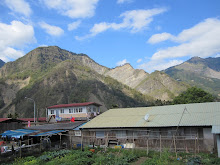
最後了,明年後就聽不到他鐃富節奏的吟唱了。
這是九月在溪口鄉溪北村錄下的一曲,全臺灣唯一還在運轉、昭和六十三年日本進口的二手草蓆編織機,鏗鏘有力地唱著歌,以圓藺草為原料,吐出織成的草蓆一縷縷。
溪北村在民國六十多年到八十年左右,全村皆以種植圓藺草及草蓆編織維生,七十年到八十年是全盛時期,而後因臺商開始前往中國大陸投資,產業逐漸移轉西進中國,對臺灣草蓆產業產生莫大衝擊。同時間,暖化效應使氣候遽變,原應五月初夏收成的圓藺草,再無法適應五月即達三十六、七度的高溫,收成前便已多數乾枯。日據時代,以製作榻榻米見長的日本人發現臺灣雲嘉南地區整體氣候、環境最適合圓藺草生長,試驗播種後,那時起便從臺灣進口原料製作榻榻米。圓藺草裡面有如棉般的白色纖維,是使草蓆或榻榻米得以冬暖夏涼又吸汗的主因。臺灣種成的圓藺草豐潤飽滿,製成的草蓆、榻榻米品質特別良好、耐久;而今大陸製成的榻榻米壽命大多不長,草的質地易碎裂。
目前溪口僅存的一家草蓆工廠廠主陳永豐憶道,以前幾乎整個村庄都在織草蓆,早上一早工作,還一直加班到半夜,兩週才得以休息一天;現在,連白天都沒事可做了。過去極盛時溪口村種植三百多頃的圓藺草,而今因氣候暖化、人力短缺,也沒有人種圓藺草了。這唯一一家的草蓆工廠,正用著十多年前剩下的倉儲原料,估計今年年底前就會用完。然後歇業。圓藺草耕種、處理過程的勞力、手工部份早已不復見,而今過去吵得全村翻天的機械音,在這最後一臺機器的最後一份差事完成後,也將完全停止。然後靜默。
圍繞著機器,或遠或近,可以聽見他不同的歌唱,發掘他每一個零件之間碰撞的聲響,從不同角度就能組成大異其趣的編曲。廠主陳永豐說,這聲音聽都聽怕了。可不曉得是不是歷史的加註與對這聲響所提示的未來有所恐懼,這台編織機鳴放出來的聲波,充斥在過去到未來的時間流裡,我們多享受當下的聆聽!但當下有多享受,就有多畏懼。該如何想像他用盡最後一根草後的剎時停擺?
結束了,請聆聽最後一臺老機器編織的美麗歌謠。
In Europe, tatamis are one of the symbol of Japanese (and by extent Asian) culture. I remember having spent a bit of time in some dojo, listening to my steps (sometimes wearing tabi socks) on the weaved grass, the Mat Rush. A caressing sound associated with a delicious smell. Because of its natural material a tatami floor makes a regulation of temperature and humidity in a house, warm in winter, cool in summer, slowly absorbing and releasing the water present in the air. It is also absorbing the sounds, contributing to an acoustically intimate architecture. One of the sounds that I will never hear in Taiwan is the sound of the crop of the grass which tatami is made of. I am wondering if the knives on an armful of the Rush makes a sound similar to the one of the rice when it is cut. This won't be heard because the Rush can't grows here anymore. The weather changed, the heat increased giving unproper conditions for this traditional industry which was developped during Japanese colonization era. Nowadays Taiwanese people prefer the western-styled bedrooms, unappropriate to the local climate of course. The last machine, an antique, is still weaving this plant in Taiwan. It will keep producing some tatami and its polyrythmic song until the end of the stock of the grass. I could have spent hours exploring the details of these sounds, moving my microphones centimeter after centimeter. For me, the owner of this workshop, the last one in Taiwan, is a kind of musician and his machine is his instrument. I had a chance to listen to his music, but he will stop it very soon.
文:許雁婷 (中文)/Yannick Dauby (English)





很棒的計畫,繼續堅持,期待你們的新作。
回覆刪除謝謝:) 有任何建議也歡迎隨時留言或寄email給我們!
回覆刪除機器穩定低頻的節奏感 渾然天成實為難得!
回覆刪除由於平常身處的環境 使得耳朵習慣於低頻的存在
如此反覆聽了幾次 頗有後工業的感覺
可否冒昧問一下
整段作品皆是現場原音嗎?
你好,謝謝留言。這整段聲音都是在工廠現場,機械原本的聲音沒錯,經過剪接將機器啓動和結束的聲音合為同一段,除此之外沒有其他編輯或修正。倒是好奇,平時習慣低頻聲音,再聽這段聲音的身體感覺是怎樣呢?
回覆刪除你好
回覆刪除請問如何聯絡陳先生購買藺草蓆?
謝謝
麗芝losunlichih@yahoo.com.tw